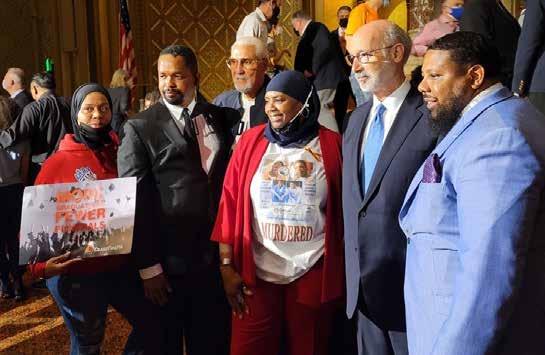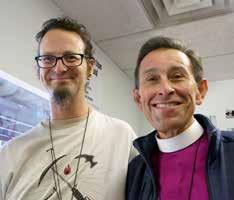
5 minute read
FaiTh IN ACTION
“Church of the Epiphany in Royersford has gone through some tough times since it was forced to leave its building in 2018 due to structural problems that rendered it unsafe. With the help of the diocese, church leaders were able to draft a letter of agreement in a very short period, and moved into what parishioners lovingly called ‘Epiphany 2.0’ in September 2022.
The vestry, assisted by the diocese, began the search for a new worship space, but quickly found that many of the locations that were available would have required significant work and capital to make it a worship space, and the cost for leasing was high.
Advertisement
Then, a vestry member saw a church building with a ‘For Rent’ sign out front. After vestry and parishioners toured the facility, the diocese visited it and provided great insight on what would be needed, and the process required to move forward.
The diocese, the Property Committee of the diocese, and my own vestry have all been instrumental in helping the congregation at Epiphany keep their hopes alive. There is great excitement at Epiphany once again.”
- The Rev. Louis Steffenhagen, deacon
7 Churches
Starting a new ministry or in need of finances for a current one, diocesan program grants awarded $92,250 to 7 churches in 2022.

Envisioning a New Beginning
Allow yourselves the chance to really dream what your church might be if it was not expending so much energy focused on buildings, people and money. How might you break free from how you have always done things and dare to envision a church that is focused on the life-giving essentials of prayer, community, worship and ministry to, and with, our neighbors?
– Bishop Gutiérrez
Process of Transformation. “We are back!” Billed as a start-up plan, Casting Nets is a process for re-envisioning church. This need became even more critical after the pandemic. As the bishop noted: “Over the past 18 months, we have discovered new and creative ways to worship, pray, connect and serve. Building on that success and momentum, we are excited to introduce the ‘Casting Nets’ initiative.”
In 2022, the diocese added the second phase to Casting Nets, working with dozens of churches. Starting with dreaming, the process is all about change. “Alive,” is how one church member described the exercise, which has participants take a look inside their churches and themselves before venturing out into the community to realize their true potential.


Providing Housing on Church Properties. Depaul USA is a national homeless services nonprofit organization that provides services for college students and lowincome adults experiencing homelessness. In 2022, the diocese worked with Depaul to open housing at two of the diocese’s churches, providing a revenue stream for the churches on unused property. The joint effort is a “wonderful partnership,” according to Tom McGill, rector’s warden at one of the churches providing housing.
Looking to the Future. Diocesan staff worked with preservationists to minimize repairs for historical churches and maximize space usage; helped one church relocate when their church’s foundation began sinking into the ground; and is working with more than a dozen churches to bring in new ministries and partners to utilize church spaces and provide an income stream for the church.

FaiTh IN ACTION
“The Episcopal Diocese of Pennsylvania has been enormously supportive of ministry at the Church of the Good Shepherd, Rosemont. With the assistance of the Offices of the Diocese, Good Shepherd is building a budding campus ministry to Main Line colleges and universities, especially Bryn Mawr College. Through a generous diocesan Growth Development Grant, the parish has been able to renovate the longneglected rectory and transform it into the Rosemont Community Retreat House, which now offers a ministry of hospitality to the local community and wider Church. In short, ministry at Good Shepherd is beginning to blossom by the grace of God and thanks to diocesan support.”

Addressing Pain and Poverty
How does God’s love abide in anyone who has the world’s goods and sees a brother or sister in need and yet refuses help?

~
1 John 3:17
Loving Presence, Adaptive Leadership Training
In response to the diocese’s call for a diocesan-wide commitment to dismantling racism through the Loving Presence Initiative, many parishes asked for support in beginning the work of racial justice in their faith communities. The challenges of COVID-19, and managing conflict around political and racial issues, left many clergy stretched thin and wondering how to balance all of these crucial needs. Supporting them was a matter of clergy wellness.
Different from anti-racism training or conflict management, Adaptive Leadership training helped parishes create an environment in which they can plan and facilitate transformative conversations around race. For faith communities that struggle with conflict or resistance around this challenging work, it provides preliminary skills in managing the kind of change that racial justice requires.
ARC Curriculum
The diocese’s Anti-Racism Commission presents a series of workshops designed to help participants understand the historic creation, preservation, and personal and institutional effects of a society built upon ideas of racial difference, which in turn support an unjust, racially based hierarchy. Completion of all five workshops over two years meets the initial clergy requirement for anti-racism education. In 2022, 53 people attended trainings.
Wellness Centers
Churches are natural meeting points for people, serving as vital hubs in their community. Since 2019, the diocese has been opening wellness centers in our churches to provide free healthcare for our communities. Last year, the diocese opened one at the historic Church of the Advocate, focusing on addiction, mental health and domestic violence. Providers are recruited and coordinated by the diocese. In addition, we worked with the Church of the Annunciation to launch a senior yoga program.
Moral Injury Program
The diocese maintains the country’s only program for female veterans who have experienced moral injury. Moral injury refers to an injury to an individual's moral conscience resulting from an act of perceived moral transgression that produces profound emotional guilt and shame, and in some cases also a sense of betrayal, anger and profound 'moral disorientation. In 2022, the diocese was able to organize the second ceremony for veterans who graduated from the diocese’s 12-week program. One female veteran was so inspired by this experience that she was invited to share her testimony at Pennsylvanian’s 2022 National Social Work Association conference.
City Camp
Since 2009, the diocese has provided summer City Camps at diocesan churches for youth ages 5-14. The cost to provide the camps is subsidized by the diocese and by some churches as well. In 2022, through a partnership with the American Diabetes Association, an extension of City Camp was created to address issues of healthy lifestyles and health equity. The program included cooking classes using recipes that were low cost for replication at home.

Health Committee
In addition, the diocese revamped its Health Committee to comprise healthcare professions, behavioral health professionals and advocates for health. Members have become certified to teach Mental Health First Aid (Youth) and will offer trainings to the diocese.
Combating Gun Violence

God of peace, we remember the children and our siblings killed today in Texas. Following those killed in Buffalo and so many other tragedies. Please let us stop, just stop, adding names to the prayer list. Lord, have mercy. When will our hearts of stone turn into hearts of flesh?
Bishop Gutiérrez
Following devastating killings in Uvalde, TX and Buffalo – within a span of a few weeks – Bishop Gutiérrez, a member of Bishops United Against Gun Violence, called the need to act against gun violence “a moral obligation.” The diocese’s Anti-Gun Violence Commission issued an action guide with ways for everyone to get involved. And, at Diocesan Convention, more than 300 people signed petitions calling on lawmakers to create gun safety laws. In collaboration with RAWTools, led by Shane Claiborne, Bishop Gutiérrez and the diocese organized trainings around turning guns into tools and worked with churches to lead that effort.
With the American Red Cross, the diocese’s Recovery Network and AntiGun Violence Commission organized a blood drive focused on gun violence being an issue that affects the larger population and all zip codes. The drive also offered screening for sickle cell disease.











